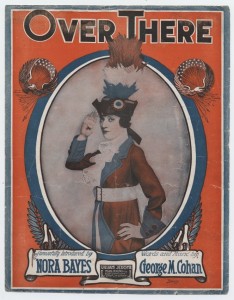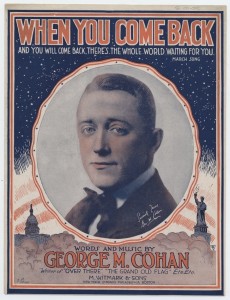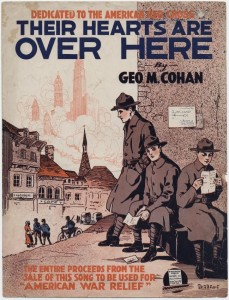George M. Cohan was an early twentieth century playwright and songwriter who was responsible for the creation of multiple patriotic pieces of music during World War I. These songs were quite popular amongst the American people and ultimately led to Cohan receiving universal praise for his work. Known as “the man who owned Broadway” before the war, Cohan’s previous success as a playwright helped play into the popularity of his war songs. Cohan’s most famous songs during this time period were “Over There,” “When You Come Back” and “Their Hearts Are Over There.”

Of Cohan’s World War I era songs, “Over There” is universally regarded as his most famous work and is often referred to as the “greatest song of the First World War” (Morehouse 17). “Over There” was written by Cohan in 1917 on the day that the United States declared war with Germany (Morehouse 126). The lyrical content of the song was written with the purpose inspiring patriotism and encouraging the American youth to join the military to help in the war effort. The song’s popularity led to also being used as propaganda during World War II and Cohan received a Congressional Medal of Honor in 1942 from President Franklin D. Roosevelt for its creation.

In 1918, World War I was coming to a close and Cohan chose to focus on American families and the return of their loved ones who had gone off to war with Germany (Reublin). That year he wrote the optimistic tune, “When You Come Back,” which can be considered as a sequel to “Over There” even though it never quite reached the same level of popularity (Reublin). Although it is not one of Cohan’s most famous works, the value of this song may perhaps be indicated by its magnificent cover art, a photo of George Cohan surrounded by a “terrific patriotic and colorful background” (Reublin). With lyrics such as “And fly our flag over old Berlin. Let’s let our message be to the Yankee across the sea” one can see Cohan’s sense of nationalism on distaste for Germany (Cohan ID: ECW SL 00-095).
Cohan also wrote another song in 1918 titled “Their Hearts Are Over There.” This song is more similar to “Over There” in title and content than “When You Come Back” (Reublin). However, it is similar to “When You Come Back” in the fact that neither song reached near the same level of acclaim that “Over There” did. Cohan dedicated this song to the work of the American Red Cross and donated the sales proceeds to the war relief effort (Reublin).Being one of America’s most famous playwrights and songwriters during his time, George Cohan was used his popularity to inspire and unify the American people during the WWI era. Through the nationalism inspired through “Over There,” the support shown for American families in “When You Come Back,” and the dedication of his song “Their Hearts are Over There” to the American Red Cross, Cohan was able to make important contributions to the American people and the war during the First World War.

Works Cited
Morehouse, Ward. George M. Cohan, Prince of the American Theater. Philadelphia: J.B. Lippincott, 1943. Print.
Reublin A. Richard. “The Music of George M. Cohan.” The Parlor Songs Academy. The Parlor Songs Academy, 2004. Web. 17 October 2015.
Cohan, George M. Over There. New York: William Jerome Publishing Corp, 1917. Irish Fest Collection. ID: IF SL 01-444.
Cohan, George M. When You Come Back. New York: M. Witmark & Sons, 1918. Ed and Cathy Ward Collection. ID: ECW SL 00-095.
Cohan, George M. Their Hearts Are Over There. New York: Waterson, Berlin & Snyder Co., 1918. Irish Fest Collection. ID: IF SL 01-328.
Nicholas Turner